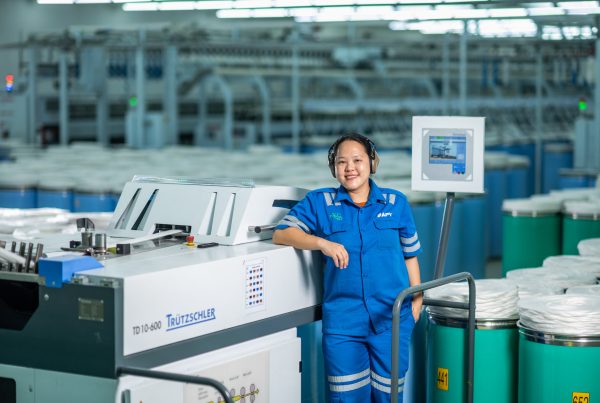In a globalised world, the ability to continuously improve not just in terms of business profit, but in all aspects of sustainability and operating efficiency, is essential to any company’s survival.
At Asia Pacific Rayon (APR), we are so serious about continuous improvement that we have a dedicated department responsible for the implementation of continuous improvement projects, called the Business Continuous Improvement Department (BCID). The BCID is primarily responsible for ensuring that the company adopts the “Kaizen” Japanese business philosophy to “change for the better”, which means taking continuous steps to ensure better production processes, higher product quality, reduction in operational costs, reduction in waste, environment performance and improvement in work safety.
Ropii Siregar, who serves as a Continuous Improvement Champion at APR’s BCID, explains that Kaizen has been introduced in APR since the company began operations.
APR’s first Kaizen project began in June 2019 with the aim to improve viscose quality. Since then, additional Kaizen Projects have been carried out to ensure growth in various aspects of the business.
Kaizen projects are typically carried out with a ‘3+1+3’ timeline: three weeks of pre-project training, one week of full project action, followed by three months of post-Kaizen project target achievements.

“Adopting Kaizen has not only supported our company in achieving operation targets and business goals thus far; it also helps to form a continuous improvement mindset in our fellow employees to contribute towards helping the company to grow sustainably,” Ropii says.
Novita, another APR employee, has also been directly involved in a Kaizen project which focused on improving the roller machine performance and wrapping process for optimised efficiency. Attending in-house pre-project training and getting hands-on experience in the Kaizen project allowed her to incorporate a Kaizen mindset and has made a huge difference in how she performs her job, she says.
“With Kaizen in mind, my team and I were able to improve the quality and consistency of APR’s fibre, and we find it much easier now to conduct better planning and deliveries on schedule. It’s also helped us to significantly reduce waste,” Novita says.
“I would say I have improved significantly in three areas – job skills, work quality, and machine knowledge,” she added.
In 2020, more than half of the successfully completed Kaizen projects were sustainability in nature. Susan Slabbert, APR Sustainability Specialist, oversees operational sustainability at the APR mill and coordinates several of the Kaizen projects there.

According to Susan, “the projects were mostly to improve on APR’s sustainability performance, such as reduced chemical consumption, increased chemical recovery for re-use and cleaner manufacturing for reduced solid waste production.”
“By utilising a Kaizen mindset, we have successfully improved our sustainability performance and identified opportunities to conform to the highest international industry standards for clean manufacturing, utilising new and advanced technology and solutions, upskill our employees and facilitated out of the box thinking to identify solutions to improve our operations,” added Susan.
APR continues its aim to continuously improve while becoming a leading responsible viscose manufacturer, in line with RGE’s 5Cs business principle that only by doing good for the Community, Country, Climate and Customer will our actions be good for the Company.
Read also
APR Continues to Meet Community Need for Environmentally-friendly Masks






